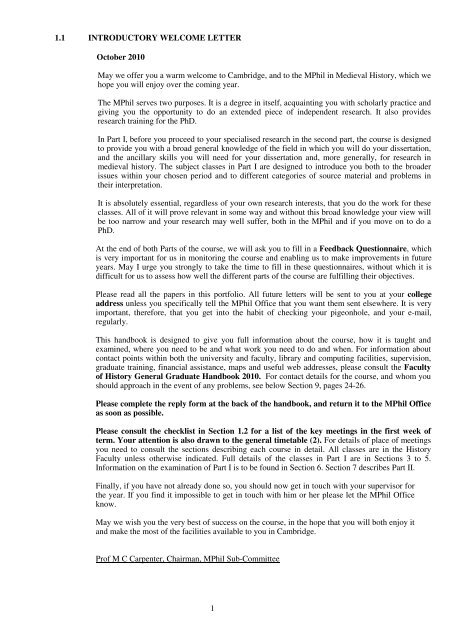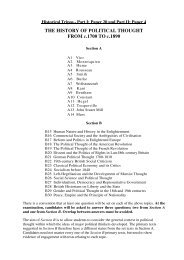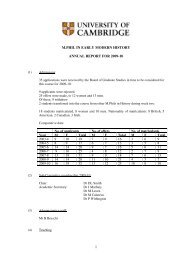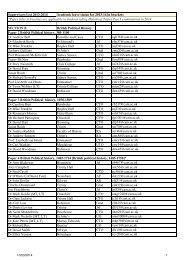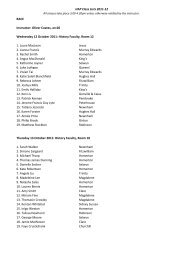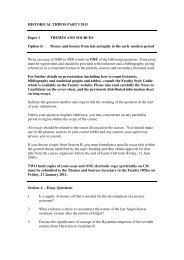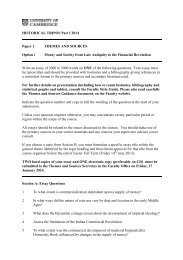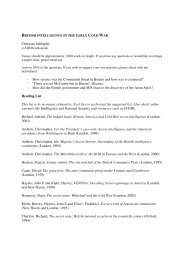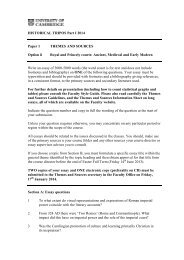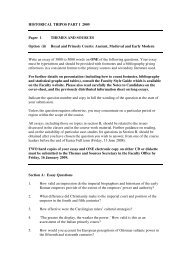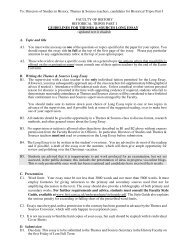Course Handbook - Faculty of History
Course Handbook - Faculty of History
Course Handbook - Faculty of History
You also want an ePaper? Increase the reach of your titles
YUMPU automatically turns print PDFs into web optimized ePapers that Google loves.
1.1 INTRODUCTORY WELCOME LETTER<br />
October 2010<br />
May we <strong>of</strong>fer you a warm welcome to Cambridge, and to the MPhil in Medieval <strong>History</strong>, which we<br />
hope you will enjoy over the coming year.<br />
The MPhil serves two purposes. It is a degree in itself, acquainting you with scholarly practice and<br />
giving you the opportunity to do an extended piece <strong>of</strong> independent research. It also provides<br />
research training for the PhD.<br />
In Part I, before you proceed to your specialised research in the second part, the course is designed<br />
to provide you with a broad general knowledge <strong>of</strong> the field in which you will do your dissertation,<br />
and the ancillary skills you will need for your dissertation and, more generally, for research in<br />
medieval history. The subject classes in Part I are designed to introduce you both to the broader<br />
issues within your chosen period and to different categories <strong>of</strong> source material and problems in<br />
their interpretation.<br />
It is absolutely essential, regardless <strong>of</strong> your own research interests, that you do the work for these<br />
classes. All <strong>of</strong> it will prove relevant in some way and without this broad knowledge your view will<br />
be too narrow and your research may well suffer, both in the MPhil and if you move on to do a<br />
PhD.<br />
At the end <strong>of</strong> both Parts <strong>of</strong> the course, we will ask you to fill in a Feedback Questionnaire, which<br />
is very important for us in monitoring the course and enabling us to make improvements in future<br />
years. May I urge you strongly to take the time to fill in these questionnaires, without which it is<br />
difficult for us to assess how well the different parts <strong>of</strong> the course are fulfilling their objectives.<br />
Please read all the papers in this portfolio. All future letters will be sent to you at your college<br />
address unless you specifically tell the MPhil Office that you want them sent elsewhere. It is very<br />
important, therefore, that you get into the habit <strong>of</strong> checking your pigeonhole, and your e-mail,<br />
regularly.<br />
This handbook is designed to give you full information about the course, how it is taught and<br />
examined, where you need to be and what work you need to do and when. For information about<br />
contact points within both the university and faculty, library and computing facilities, supervision,<br />
graduate training, financial assistance, maps and useful web addresses, please consult the <strong>Faculty</strong><br />
<strong>of</strong> <strong>History</strong> General Graduate <strong>Handbook</strong> 2010. For contact details for the course, and whom you<br />
should approach in the event <strong>of</strong> any problems, see below Section 9, pages 24-26.<br />
Please complete the reply form at the back <strong>of</strong> the handbook, and return it to the MPhil Office<br />
as soon as possible.<br />
Please consult the checklist in Section 1.2 for a list <strong>of</strong> the key meetings in the first week <strong>of</strong><br />
term. Your attention is also drawn to the general timetable (2). For details <strong>of</strong> place <strong>of</strong> meetings<br />
you need to consult the sections describing each course in detail. All classes are in the <strong>History</strong><br />
<strong>Faculty</strong> unless otherwise indicated. Full details <strong>of</strong> the classes in Part I are in Sections 3 to 5.<br />
Information on the examination <strong>of</strong> Part I is to be found in Section 6. Section 7 describes Part II.<br />
Finally, if you have not already done so, you should now get in touch with your supervisor for<br />
the year. If you find it impossible to get in touch with him or her please let the MPhil Office<br />
know.<br />
May we wish you the very best <strong>of</strong> success on the course, in the hope that you will both enjoy it<br />
and make the most <strong>of</strong> the facilities available to you in Cambridge.<br />
Pr<strong>of</strong> M C Carpenter, Chairman, MPhil Sub-Committee<br />
1


